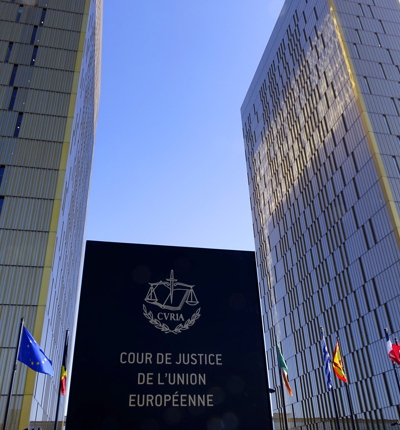
Legal challenge to biomass rules in Renewable Energy Directive issued at European court
A group of individuals and NGOs from across Europe and the United States are bringing a legal challenge against the EU Directive on Renewable Energy 2018. The case has been formally lodged at the Court of Justice of the EU (CJEU) today.
Posted on 04 March 2019
In their legal case, the group of claimants argue that the Directive, also known as RED II, requires EU member states to treat the burning of wood in the biomass industry as carbon neutral even though it releases CO2 into the atmosphere. The claimants allege that the inclusion of forest biomass as a carbon neutral source of renewable energy fatally undermines the greenhouse gas emission reduction goals of the Directive, violates Art.191 of the Treaty on the Functioning of the European Union and breaches a number of their rights under the Charter of Fundamental Rights.
The Directive binds the EU to achieve a laudable target of at least 32% of its generated energy from renewable sources by 2030, to be made up of individual targets for Member States. However, the legal case argues that the inclusion of forest biomass in the Directive will increase demand for forest biomass energy and result in more forest degradation, more CO2 emissions, and the loss of natural carbon sinks.
The Claimants demonstrate that trees felled to be used in biomass energy production include ancient woodlands that cannot be replaced, important habitats and sites of cultural significance. The legal case argues that by treating biomass combustion as carbon neutral the Directive incentivises the continued logging of natural forests in Europe and North America. The claimants are asking the Court to annul the forest biomass provisions of the RED II in order to render forest wood ineligible for meeting EU Member State renewable energy targets and ineligible for subsidies.
The clients bringing the case, represented by law firm Leigh Day, include:
- Residents in France, who live near a biomass power plant, which is causing public health, noise, dust, and air pollution problems
- Individuals and campaigning NGOs both in Slovakia and Estonia, who are concerned about further logging in areas of cultural and spiritual significance
- Group in Romania arguing that industrial logging for biomass of particularly vulnerable forest ecosystems is catastrophic for both ecological and climate change grounds
- Campaigner in Ireland, who is concerned that co-firing peat plants with forest biomass will perpetuate peat bog extraction
- Resident in the southeastern United States who lives near forests destroyed for wood pellet exports to the EU
The claimants have been assisted in their case by additional research provided by the Partnership for Policy Integrity, an organisation based in the United States, which uses science, legal action, and strategic communications to promote sound energy policy and to help citizens enact science-based policies that protect air, water, ecosystems, and the climate. Their current work focuses on biomass energy, and oil and gas extraction.
The case is also assisted by the Center for Climate Integrity, which provides support to those who have suffered damage due to climate change and who seek to hold climate polluters accountable.
As well as the environmental implications of the case, it is also raises significant access to justice issues. The European Courts have historically adopted a very strict approach to who can bring such cases, following a judgment concerning the importation of clementines in 1963 (the so-called Plaumann test after the case of the same name). Since then, many individuals and groups have tried to bring cases to challenge the decisions of the EU institutions, but they have continually been denied entry by the courts refusing to accept they are “directly and individually” concerned by the decision they seek to challenge.
The European Courts’ strict approach to who can bring a case to the court, also known as ‘standing’, has been the subject of controversy for decades. The EU is a party in its own right to an international convention called the Aarhus Convention, which seeks to establish minimum standards for environmental rights such as access to information, public participation and environmental justice. In 2017, the Aarhus Convention Compliance Committee, which scrutinises compliance with the Convention, found the EU in breach of its provisions on access to justice because of the European Court of Justice’s (CJEU) position on standing. The Committee has called on the CJEU to adopt a more flexible approach in the future.
Rowan Smith, solicitor from law firm Leigh Day, said:
“Our clients believe that the European Union’s policy on biomass as a method of energy production is fundamentally flawed as it should not be classified as carbon neutral and it encourages the destruction of forest ecosystems across the world in the false name of ‘renewable energy’.”
Anna Dews, solicitor from law firm Leigh Day, said:
“The Directive’s targets for increased renewable energy should genuinely contribute to tackling runaway climate change. There is a central illogicality in promoting the cutting down of trees in the name of combating global warming.”
Carol Day, consultant solicitor at Leigh Day said:
“The plaintiffs in this case will be effected by RED II in a variety of ways. There are individuals and community groups who will suffer economic and cultural losses, alongside potential effects on their health - and there are environmental NGOs that have campaigned for many years on these issues in the wider public interest. They all deserve to have their case heard so we sincerely hope the CJEU will use this opportunity to adopt a more considered and long overdue approach to access to the court.”
Dr. Mary S. Booth, director of the Partnership for Policy Integrity and lead science advisor on the case, said:
“The EU’s policy relies on the false and reckless assumption that burning forest wood is carbon neutral. However, scientists from around the world, including the EU’s own science advisors, have warned that burning forest wood actually increases emissions relative to fossil fuels.”

